Unit 10 if you go to the party, you’ll have a great time. Section B(2a-2e)说课比赛课件(PPT43张)
文档属性
| 名称 | Unit 10 if you go to the party, you’ll have a great time. Section B(2a-2e)说课比赛课件(PPT43张) | 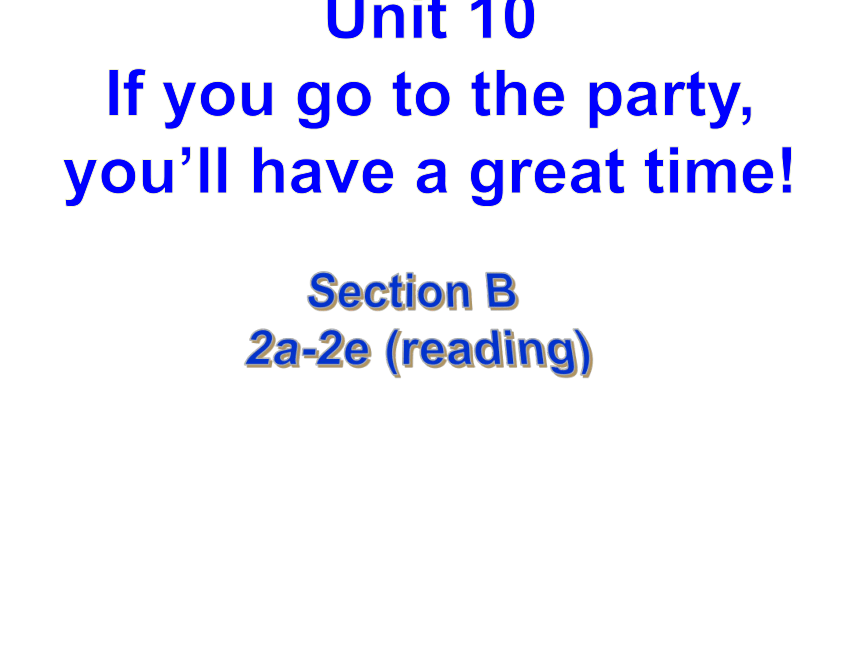 | |
| 格式 | zip | ||
| 文件大小 | 1.7MB | ||
| 资源类型 | 教案 | ||
| 版本资源 | 人教新目标(Go for it)版 | ||
| 科目 | 英语 | ||
| 更新时间 | 2016-09-16 00:27:42 | ||
图片预览

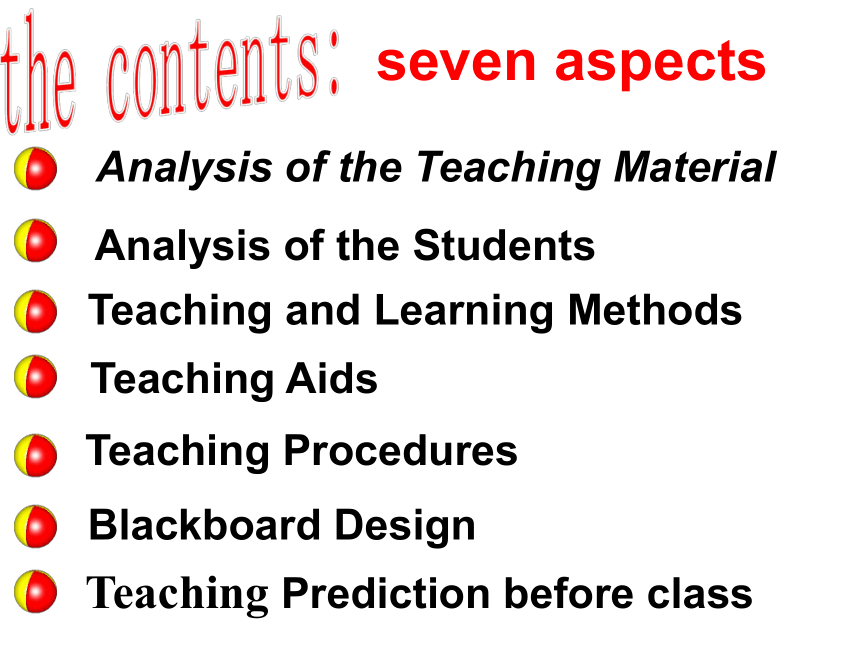
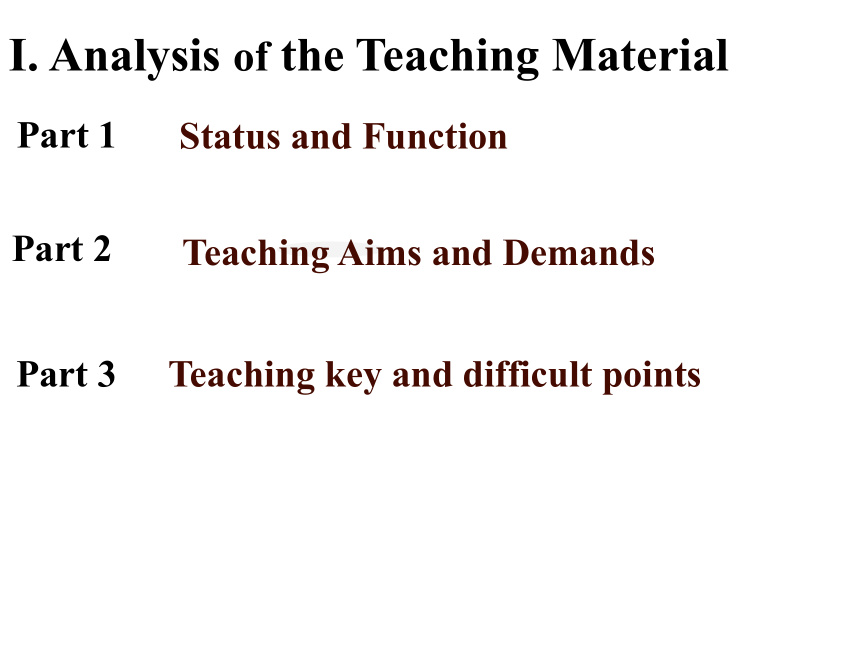
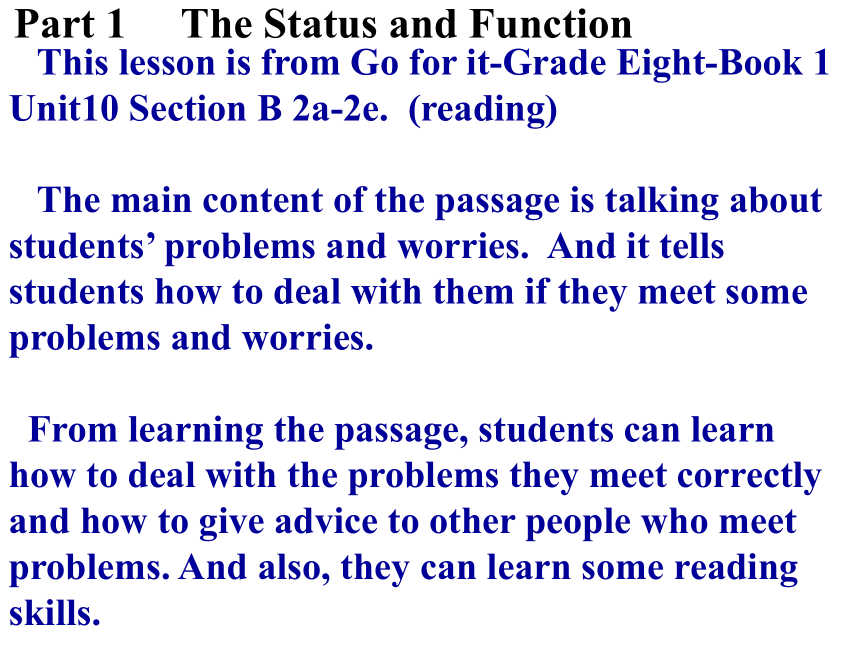
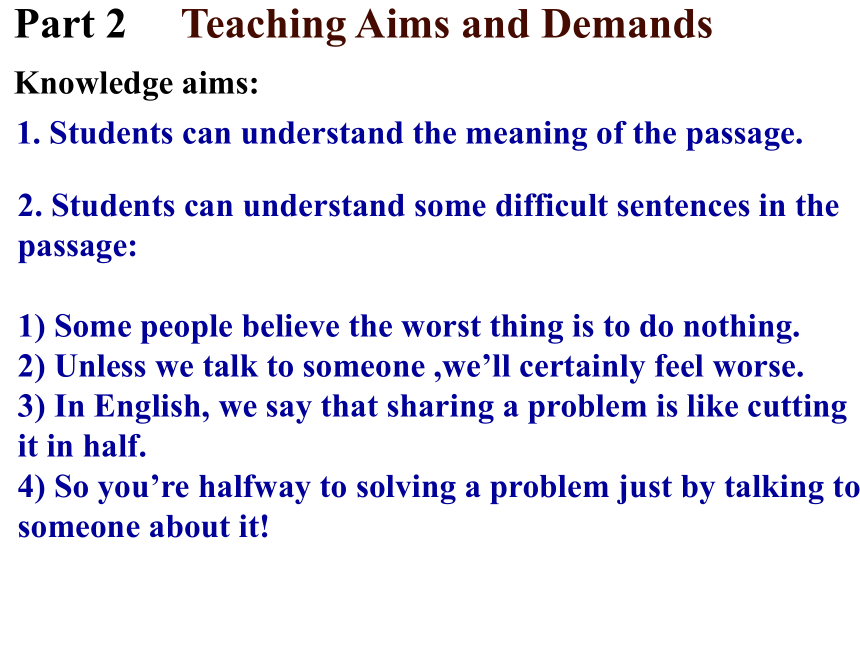
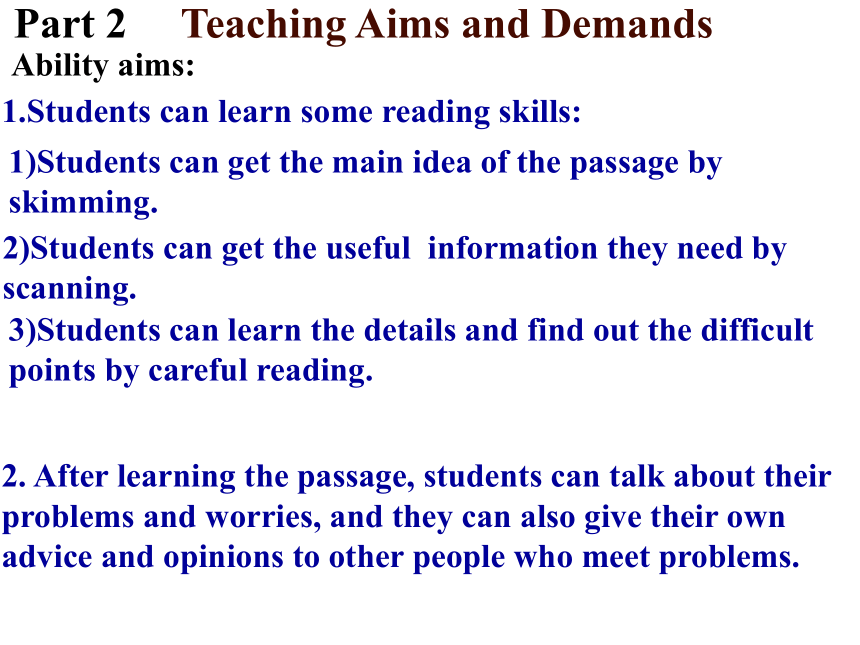
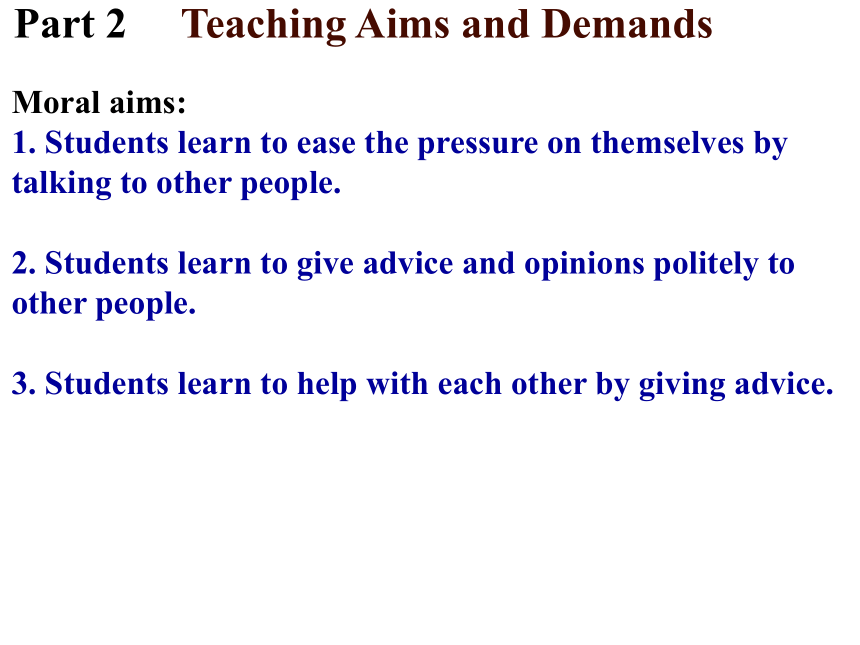
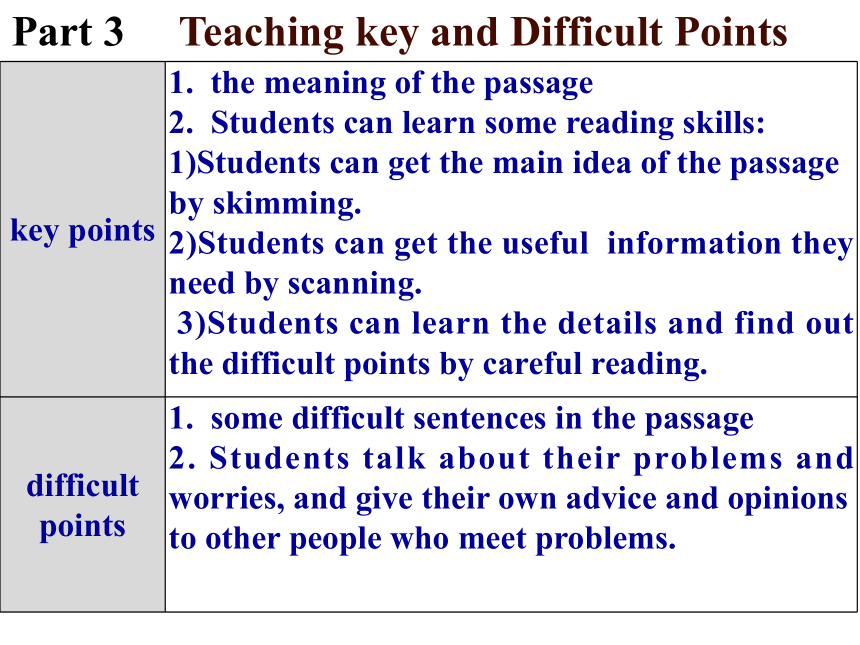
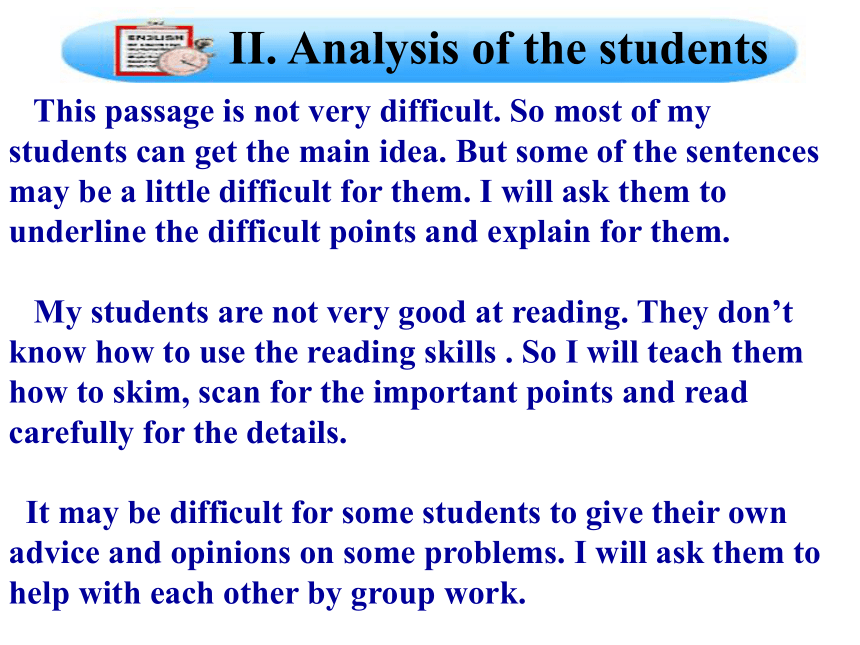
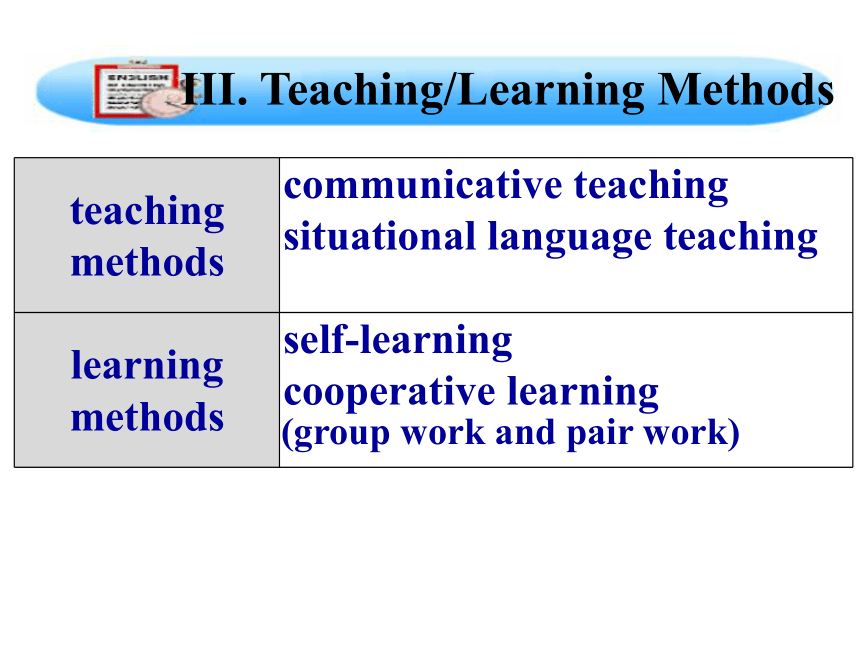
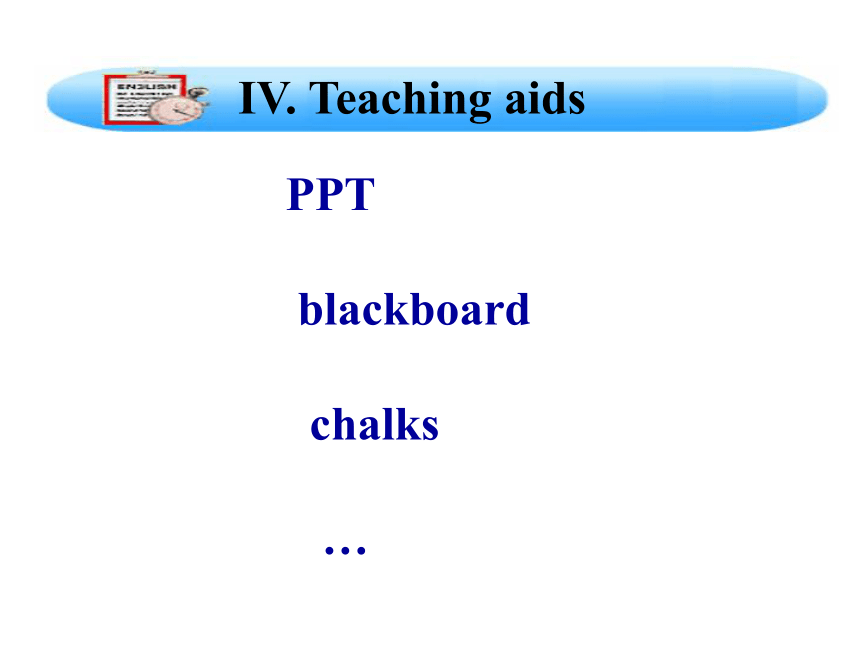
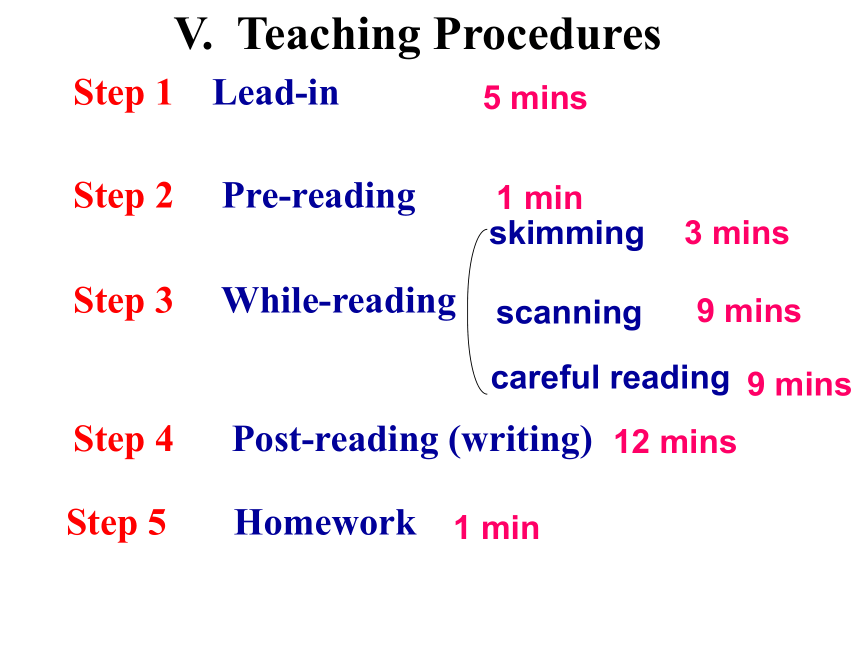
文档简介
课件43张PPT。Unit 10
If you go to the party,
you’ll have a great time!Section B
2a-2e (reading)Analysis of the Teaching Material? Teaching AidsBlackboard DesignTeaching and Learning Methodsthe contents:Analysis of the Students?Teaching Procedures?Teaching Prediction before class
? seven aspectsTeaching Aims and Demands
Status and FunctionI. Analysis of the Teaching MaterialTeaching key and difficult pointsPart 1 The Status and Function This lesson is from Go for it-Grade Eight-Book 1 Unit10 Section B 2a-2e. (reading)
The main content of the passage is talking about students’ problems and worries. And it tells students how to deal with them if they meet some problems and worries.
From learning the passage, students can learn how to deal with the problems they meet correctly and how to give advice to other people who meet problems. And also, they can learn some reading skills.Knowledge aims: Part 2 Teaching Aims and Demands
1. Students can understand the meaning of the passage.2. Students can understand some difficult sentences in the passage:
1) Some people believe the worst thing is to do nothing.
2) Unless we talk to someone ,we’ll certainly feel worse.
3) In English, we say that sharing a problem is like cutting
it in half.
4) So you’re halfway to solving a problem just by talking to someone about it!
1.Students can learn some reading skills:Part 2 Teaching Aims and Demands1)Students can get the main idea of the passage by
skimming. 2)Students can get the useful information they need by
scanning. 3)Students can learn the details and find out the difficult
points by careful reading. 2. After learning the passage, students can talk about their problems and worries, and they can also give their own
advice and opinions to other people who meet problems.Ability aims: Moral aims:
1. Students learn to ease the pressure on themselves by talking to other people.
2. Students learn to give advice and opinions politely to other people.
3. Students learn to help with each other by giving advice.Part 2 Teaching Aims and DemandsPart 3 Teaching key and Difficult Points III. Teaching/Learning Methods (group work and pair work) PPT
blackboard
chalks
…
IV. Teaching aidsV. Teaching ProceduresStep 5 HomeworkStep 1 Lead-inStep 2 Pre-readingStep 3 While-readingStep 4 Post-reading (writing)5 mins1 minskimmingscanningcareful reading3 mins9 mins9 mins1 min12 minsUnit 10
If you go to the party,
you’ll have a great time!
Section B
2a-2e
(reading)Lead-in:I have too much work to do every day. my worryLead-in:My students sometimes fight with each other.my worrymy worryLead-in:Some students always forget to do homework.Lead-in:My son sometimes gets ill.Purpose: Show the students an example.
Lead the students to speak out. my worryPai r workWhat kinds of things do you worry about? Who do you usually go to for help? 2aI’m not good at math. I usually worry about it.If I have a math problem, I will go to my math teacher for help. Lead---in:give advice to each otherPurpose: Oral practice. Review “if” sentence pattern students learned in section A. The students can give simple advice by using “if”. Then they can give advice to other people more easily after learning the passage.worries and problemsPre-reading: guessing
She lost her wallet.What’s Laura’s worry? What did she do after she lost her wallet?Purpose: Predict the content of the passage.b. If people have problems, they should talk
to other people.c. If people have problems, they should
keep them to themselves. Skimming2bLook at the statements, Which is the main idea of this passage.a. If people have problems, they should
get advice from an expert. While--reading Students these days often have a lot of worries. Sometimes they have problems with their schoolwork, and sometimes with their friends. Some people think the worst thing is to do nothing. Laura Mills, a teenager from Washington, agrees. “Problems and worries are normal in life,” says Laura. “But I think talking to someone helps a lot. If we don’t talk to someone, we’ll certainly feel worse.” Laura once lost her purse, and worried for days. She was afraid to tell her parents shout it. She even walked three miles to school each day because she didn’t have any money. She just kept thinking. “If I tell my parents, they’ll be angry!” But in the end, she talked to her parents and they were really understanding. Her dad said he sometimes made careless mistakes himself. They got her a new purse and asked her to be more careful. “I will always remember to share my problems in the future!” Laura says. Robert Hunt advises students about common problems. He feels the same way as Laura. “It is best not to avoid our problems. We should always try to solve (解决) them.” He thinks that you can first find someone to talk to. This person doesn’t need to be an expert (专家) like himself. Students often forget that their parents have more experience than them, and are always there to help them. In English, we say that sharing a problem is like cutting it in half. So you’re halfway to solving a problem if you talk to someone about it!b. If people have problems, they should talk
to other people.c. If people have problems, they should
keep them to themselves. Skimming2bLook at the statements, Which is the main idea of this passage√a. If people have problems, they should
get advice from an expert. While--readingReading skill : Students can get the main idea of the passage by skimming. Task1answer the following questions:Task 2在文中找出下列句子的同义句。1.What is the worst thing to do if you have a problem?
2.What does Laura think of the problems and worries in life?
If we don’t talk to someone, we’ll certainly feel worse.
ScanningWhile--readingRead paragraph1 Students these days often have a lot of worries. Sometimes they have problems with their schoolwork, and sometimes with their friends. Some people think the worst thing is to do nothing. Laura Mills, a teenager from Washington, agrees. “Problems and worries are normal in life,” says Laura. “But I think talking to someone helps a lot. Unless we talk to someone, we’ll certainly feel worse.” Problems and worries are normal in life.Unless we talk to someone, we’ll certainly feel worse.Task1answer the questions:Task 2在文中找出下列句子的同义句。2.What does Laura think of the problems and worries in life?
If we don’t talk to someone, we’ll certainly feel worse.
ScanningWhile--readingRead paragraph11.What is the worst thing to do if you have a problem?To do nothing.Read paragraph2____ for days
___ afraid to tell her parents
____ three miles to school
kept ___________ understanding
____ careless mistakes
___ her a new wallet
_____her to be more carefulIn the end She talked to her parentsLaura once ___her walletSo she’ll always remember to ___ her problems in the future.LauraLaura’s parentsWhile--readingScanning Laura once lost her purse, and worried for days. She was afraid to tell her parents shout it. She even walked three miles to school each day because she didn’t have any money. She just kept thinking. “If I tell my parents, they’ll be angry!” But in the end, she talked to her parents and they were really understanding. Her dad said he sometimes made careless mistakes himself. They got her a new purse and asked her to be more careful. “I will always remember to share my problems in the future!” Laura says.worried for days
was afraid to tell her parents
walked three miles to school
kept thinkingwere understanding
made careless mistakes
got her a new wallet
asked her to be more carefulIn the end She talked to her parentsLaura once lost her walletSo she’ll always remember to share her problems in the future.LauraLaura’s parents1.According to the passage Robert Hunt might be _____.
A. Laura’s teacher??????? B. the writer of the passage
C. an expert on students’ problems
2.What is the first thing you should do when you want to solve the problem?
3.Our parents can give us good advice about our problems because
____________________________________________.
____________________________________.Read paragraph3ScanningWhile--reading Robert Hunt advises students about common problems. He feels the same way as Laura. “It is best not to avoid our problems. We should always try to solve (解决) them.” He thinks that you can first find someone to talk to. This person doesn’t need to be an expert (专家) like himself. Students often forget that their parents have more experience than them, and are always there to help them. In English, we say that sharing a problem is like cutting it in half. So you’re halfway to solving a problem if you talk to someone about it!1.According to the passage Robert Hunt might be _____.
A. Laura’s teacher??????? B. the writer of the passage
C. an expert on students’ problems
2.What is the first thing you should do when you want to solve the problem?
3.Our parents can give us good advice about our problems because
_________________________________________________________.
____________________________________.Read paragraph3CThe first thing is to find someone to talk to.They have more experience and are always
there to help them.ScanningWhile--readingReading skill: Students can get the useful information they need by scanning. Fill in the blanks with the phrases in the box. 2ddiscuss your problems
tell her parents
unless you talk
run away from
talk to someone
share her problems
to do nothing How?First : Read and understand the Phrases
Next: Read the text, fill the easier phrases
Then: Read and fill the others.While--readingunderline the difficult pointsStudents often have a lot of problems
and worries. Laura Mills thinks the worst thing is _____________. She thinks you’ll feel worse if you don’t ______________ about your problems. Laura remembers that she once lost her wallet and was afraid to _____________ about it. Now she believes you cannot feel better _______________ to someone.to do nothingtalk to someonetell her parentsunless you talkShe says she will always __________________ in the future. Robert Hunt agrees with Laura. He thinks you should not _______________ your problems, but you should try to solve them. If you cannot talk to an expert like Robert, you can ____________________ with your parents because they have a lot of experience.share her problemsrun away fromdiscuss your problemsReading skill: Students can learn the details and find out the difficult points by careful reading. Answer the students’ questions and explain some difficult sentences in the passage:
1) Some people believe the worst thing is to do nothing.
2) Unless we talk to someone ,we’ll certainly feel worse.
3) In English, we say that sharing a problem is like cutting it in half.
4) So you’re halfway to solving a problem just by talking to someone about it!Wang Hua is my friend . He has problems with his English. Try to give him some advice. My friend Wang Hua has problems with his English.
__________________________________________________________________________________________________________________________________________________________________________________________________________________________________.I think he can make it.writingpost-readingYou can talk to …
You can ask …for help.
I advise you to do sth.
You should be more careful, take notes, study hard , listen carefully…
If you…, you’ll…. My friend Wang Hua has problems with his English. _________________________________________________________________________________________________________________________________________________________________________________________________________________________________.I think he can make it.How to give advice to Wang Hua?group work Homework1. Read the passage again after class.
2. Work on 2e. Ask three students the
following questions. Take notes of
their answers.VI. Blackboard Design
Unit 101. Reading skills: skimming, scanning, careful reading
2. Some difficult sentences:
1) Some people believe the worst thing is to do nothing.
2) Unless we talk to someone ,we’ll certainly feel worse.
3) In English, we say that sharing a problem is like cutting
it in half.
4) So you’re halfway to solving a problem just by talking to
someone about it!
3. how to give advice on problems and worries
1)You can talk to … 2)You can ask …for help.
3)I advise you to do sth. 4)You should … 5)If you…, you’ll….
Section B (2a-2e)VII. Prediction before class1. Some of the sentences in this passage are difficult to understand, so I will ask them to underline the difficult sentences by reading carefully, then ask them to discuss. Finally, I will explain the sentences for them. 2. It may be a little difficult for students to give their own advice and opinions to other people who meet problems. So I will give them some useful expressions before they write.
Thanks for listening!
If you go to the party,
you’ll have a great time!Section B
2a-2e (reading)Analysis of the Teaching Material? Teaching AidsBlackboard DesignTeaching and Learning Methodsthe contents:Analysis of the Students?Teaching Procedures?Teaching Prediction before class
? seven aspectsTeaching Aims and Demands
Status and FunctionI. Analysis of the Teaching MaterialTeaching key and difficult pointsPart 1 The Status and Function This lesson is from Go for it-Grade Eight-Book 1 Unit10 Section B 2a-2e. (reading)
The main content of the passage is talking about students’ problems and worries. And it tells students how to deal with them if they meet some problems and worries.
From learning the passage, students can learn how to deal with the problems they meet correctly and how to give advice to other people who meet problems. And also, they can learn some reading skills.Knowledge aims: Part 2 Teaching Aims and Demands
1. Students can understand the meaning of the passage.2. Students can understand some difficult sentences in the passage:
1) Some people believe the worst thing is to do nothing.
2) Unless we talk to someone ,we’ll certainly feel worse.
3) In English, we say that sharing a problem is like cutting
it in half.
4) So you’re halfway to solving a problem just by talking to someone about it!
1.Students can learn some reading skills:Part 2 Teaching Aims and Demands1)Students can get the main idea of the passage by
skimming. 2)Students can get the useful information they need by
scanning. 3)Students can learn the details and find out the difficult
points by careful reading. 2. After learning the passage, students can talk about their problems and worries, and they can also give their own
advice and opinions to other people who meet problems.Ability aims: Moral aims:
1. Students learn to ease the pressure on themselves by talking to other people.
2. Students learn to give advice and opinions politely to other people.
3. Students learn to help with each other by giving advice.Part 2 Teaching Aims and DemandsPart 3 Teaching key and Difficult Points III. Teaching/Learning Methods (group work and pair work) PPT
blackboard
chalks
…
IV. Teaching aidsV. Teaching ProceduresStep 5 HomeworkStep 1 Lead-inStep 2 Pre-readingStep 3 While-readingStep 4 Post-reading (writing)5 mins1 minskimmingscanningcareful reading3 mins9 mins9 mins1 min12 minsUnit 10
If you go to the party,
you’ll have a great time!
Section B
2a-2e
(reading)Lead-in:I have too much work to do every day. my worryLead-in:My students sometimes fight with each other.my worrymy worryLead-in:Some students always forget to do homework.Lead-in:My son sometimes gets ill.Purpose: Show the students an example.
Lead the students to speak out. my worryPai r workWhat kinds of things do you worry about? Who do you usually go to for help? 2aI’m not good at math. I usually worry about it.If I have a math problem, I will go to my math teacher for help. Lead---in:give advice to each otherPurpose: Oral practice. Review “if” sentence pattern students learned in section A. The students can give simple advice by using “if”. Then they can give advice to other people more easily after learning the passage.worries and problemsPre-reading: guessing
She lost her wallet.What’s Laura’s worry? What did she do after she lost her wallet?Purpose: Predict the content of the passage.b. If people have problems, they should talk
to other people.c. If people have problems, they should
keep them to themselves. Skimming2bLook at the statements, Which is the main idea of this passage.a. If people have problems, they should
get advice from an expert. While--reading Students these days often have a lot of worries. Sometimes they have problems with their schoolwork, and sometimes with their friends. Some people think the worst thing is to do nothing. Laura Mills, a teenager from Washington, agrees. “Problems and worries are normal in life,” says Laura. “But I think talking to someone helps a lot. If we don’t talk to someone, we’ll certainly feel worse.” Laura once lost her purse, and worried for days. She was afraid to tell her parents shout it. She even walked three miles to school each day because she didn’t have any money. She just kept thinking. “If I tell my parents, they’ll be angry!” But in the end, she talked to her parents and they were really understanding. Her dad said he sometimes made careless mistakes himself. They got her a new purse and asked her to be more careful. “I will always remember to share my problems in the future!” Laura says. Robert Hunt advises students about common problems. He feels the same way as Laura. “It is best not to avoid our problems. We should always try to solve (解决) them.” He thinks that you can first find someone to talk to. This person doesn’t need to be an expert (专家) like himself. Students often forget that their parents have more experience than them, and are always there to help them. In English, we say that sharing a problem is like cutting it in half. So you’re halfway to solving a problem if you talk to someone about it!b. If people have problems, they should talk
to other people.c. If people have problems, they should
keep them to themselves. Skimming2bLook at the statements, Which is the main idea of this passage√a. If people have problems, they should
get advice from an expert. While--readingReading skill : Students can get the main idea of the passage by skimming. Task1answer the following questions:Task 2在文中找出下列句子的同义句。1.What is the worst thing to do if you have a problem?
2.What does Laura think of the problems and worries in life?
If we don’t talk to someone, we’ll certainly feel worse.
ScanningWhile--readingRead paragraph1 Students these days often have a lot of worries. Sometimes they have problems with their schoolwork, and sometimes with their friends. Some people think the worst thing is to do nothing. Laura Mills, a teenager from Washington, agrees. “Problems and worries are normal in life,” says Laura. “But I think talking to someone helps a lot. Unless we talk to someone, we’ll certainly feel worse.” Problems and worries are normal in life.Unless we talk to someone, we’ll certainly feel worse.Task1answer the questions:Task 2在文中找出下列句子的同义句。2.What does Laura think of the problems and worries in life?
If we don’t talk to someone, we’ll certainly feel worse.
ScanningWhile--readingRead paragraph11.What is the worst thing to do if you have a problem?To do nothing.Read paragraph2____ for days
___ afraid to tell her parents
____ three miles to school
kept ___________ understanding
____ careless mistakes
___ her a new wallet
_____her to be more carefulIn the end She talked to her parentsLaura once ___her walletSo she’ll always remember to ___ her problems in the future.LauraLaura’s parentsWhile--readingScanning Laura once lost her purse, and worried for days. She was afraid to tell her parents shout it. She even walked three miles to school each day because she didn’t have any money. She just kept thinking. “If I tell my parents, they’ll be angry!” But in the end, she talked to her parents and they were really understanding. Her dad said he sometimes made careless mistakes himself. They got her a new purse and asked her to be more careful. “I will always remember to share my problems in the future!” Laura says.worried for days
was afraid to tell her parents
walked three miles to school
kept thinkingwere understanding
made careless mistakes
got her a new wallet
asked her to be more carefulIn the end She talked to her parentsLaura once lost her walletSo she’ll always remember to share her problems in the future.LauraLaura’s parents1.According to the passage Robert Hunt might be _____.
A. Laura’s teacher??????? B. the writer of the passage
C. an expert on students’ problems
2.What is the first thing you should do when you want to solve the problem?
3.Our parents can give us good advice about our problems because
____________________________________________.
____________________________________.Read paragraph3ScanningWhile--reading Robert Hunt advises students about common problems. He feels the same way as Laura. “It is best not to avoid our problems. We should always try to solve (解决) them.” He thinks that you can first find someone to talk to. This person doesn’t need to be an expert (专家) like himself. Students often forget that their parents have more experience than them, and are always there to help them. In English, we say that sharing a problem is like cutting it in half. So you’re halfway to solving a problem if you talk to someone about it!1.According to the passage Robert Hunt might be _____.
A. Laura’s teacher??????? B. the writer of the passage
C. an expert on students’ problems
2.What is the first thing you should do when you want to solve the problem?
3.Our parents can give us good advice about our problems because
_________________________________________________________.
____________________________________.Read paragraph3CThe first thing is to find someone to talk to.They have more experience and are always
there to help them.ScanningWhile--readingReading skill: Students can get the useful information they need by scanning. Fill in the blanks with the phrases in the box. 2ddiscuss your problems
tell her parents
unless you talk
run away from
talk to someone
share her problems
to do nothing How?First : Read and understand the Phrases
Next: Read the text, fill the easier phrases
Then: Read and fill the others.While--readingunderline the difficult pointsStudents often have a lot of problems
and worries. Laura Mills thinks the worst thing is _____________. She thinks you’ll feel worse if you don’t ______________ about your problems. Laura remembers that she once lost her wallet and was afraid to _____________ about it. Now she believes you cannot feel better _______________ to someone.to do nothingtalk to someonetell her parentsunless you talkShe says she will always __________________ in the future. Robert Hunt agrees with Laura. He thinks you should not _______________ your problems, but you should try to solve them. If you cannot talk to an expert like Robert, you can ____________________ with your parents because they have a lot of experience.share her problemsrun away fromdiscuss your problemsReading skill: Students can learn the details and find out the difficult points by careful reading. Answer the students’ questions and explain some difficult sentences in the passage:
1) Some people believe the worst thing is to do nothing.
2) Unless we talk to someone ,we’ll certainly feel worse.
3) In English, we say that sharing a problem is like cutting it in half.
4) So you’re halfway to solving a problem just by talking to someone about it!Wang Hua is my friend . He has problems with his English. Try to give him some advice. My friend Wang Hua has problems with his English.
__________________________________________________________________________________________________________________________________________________________________________________________________________________________________.I think he can make it.writingpost-readingYou can talk to …
You can ask …for help.
I advise you to do sth.
You should be more careful, take notes, study hard , listen carefully…
If you…, you’ll…. My friend Wang Hua has problems with his English. _________________________________________________________________________________________________________________________________________________________________________________________________________________________________.I think he can make it.How to give advice to Wang Hua?group work Homework1. Read the passage again after class.
2. Work on 2e. Ask three students the
following questions. Take notes of
their answers.VI. Blackboard Design
Unit 101. Reading skills: skimming, scanning, careful reading
2. Some difficult sentences:
1) Some people believe the worst thing is to do nothing.
2) Unless we talk to someone ,we’ll certainly feel worse.
3) In English, we say that sharing a problem is like cutting
it in half.
4) So you’re halfway to solving a problem just by talking to
someone about it!
3. how to give advice on problems and worries
1)You can talk to … 2)You can ask …for help.
3)I advise you to do sth. 4)You should … 5)If you…, you’ll….
Section B (2a-2e)VII. Prediction before class1. Some of the sentences in this passage are difficult to understand, so I will ask them to underline the difficult sentences by reading carefully, then ask them to discuss. Finally, I will explain the sentences for them. 2. It may be a little difficult for students to give their own advice and opinions to other people who meet problems. So I will give them some useful expressions before they write.
Thanks for listening!
同课章节目录
- Unit 1 Where did you go on vacation?
- Section A
- Section B
- Unit 2 How often do you exercise?
- Section A
- Section B
- Unit 3 I'm more outgoing than my sister.
- Section A
- Section B
- Unit 4 What's the best movie theater?
- Section A
- Section B
- Unit 5 Do you want to watch a game show?
- Section A
- Section B
- Unit 6 I'm going to study computer science.
- Section A
- Section B
- Unit 7 Will people have robots?
- Section A
- Section B
- Unit 8 How do you make a banana milk shake?
- Section A
- Section B
- Unit 9 Can you come to my party?
- Section A
- Section B
- Unit 10 If you go to the party, you'll have a grea
- Section A
- Section B
